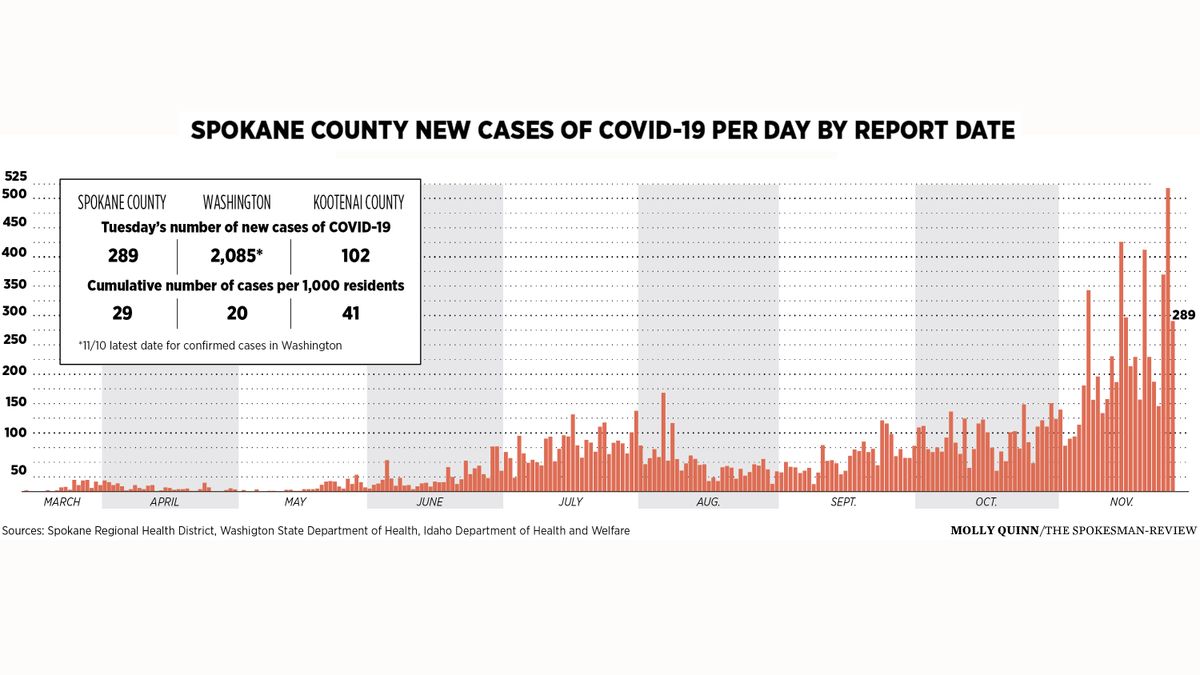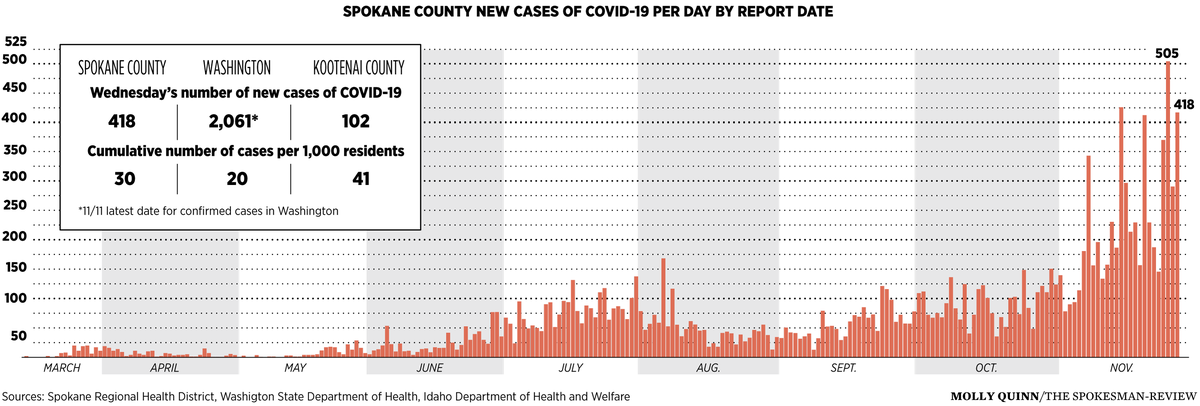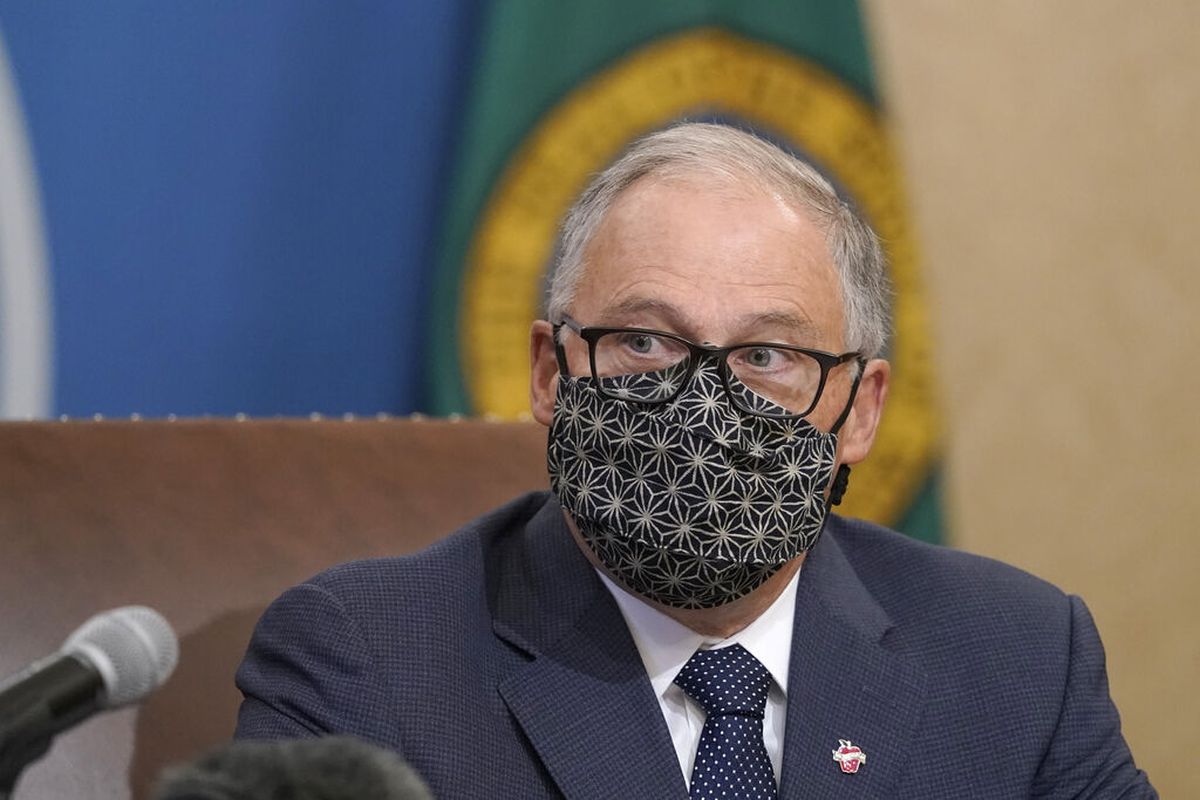With COVID-19 hospitalizations rising, Inslee warns of ‘catastrophic loss’ from current trajectory
Washington Gov. Jay Inslee speaks during a news conference, Sunday, Nov. 15, 2020, at the Capitol in Olympia, Wash. Inslee announced new restrictions on businesses and social gatherings for the next four weeks as the state continues to combat a rising number of coronavirus cases. (Ted S. Warren)
OLYMPIA – If the trajectory of COVID-19 cases doesn’t change, Washington and its hospitals could face “catastrophic loss,” Gov. Jay Inslee said Tuesday.
In a news conference just two days before Thanksgiving, Inslee and other health officials again stressed the importance of not gathering, as hospitals may not be able to handle it.
“We cannot tolerate the continuation of that straight-up curve any longer,” Inslee said.
The Spokane Regional Health District reported 289 new cases Tuesday, bringing the county total to 15,337. About 62% of those are considered recovered.
There are 79 county residents hospitalized due to the virus. Most of the total hospitalizations are people older than 50. But of the county’s 686 total hospitalizations, 124 were people under 40.
The county confirmed eight more deaths Tuesday, bringing the county total to 250 deaths due to the virus.
State Health Officer Dr. Kathy Lofy said she was “very concerned” for the trajectory of the current outbreak.
Lofy said the number of confirmed and suspected patients in the hospital due to COVID-19 is increasing at a very steep rate. If the rate continues, Lofy said hospitals will need to delay most of their nonessential procedures and begin using their surge plans – plans developed to help hospitals care for more patients than normal.
Those plans can include pausing nonemergent surgeries, purchasing more intensive care unit beds or creating triage centers within the hospital, said Dr. Nathan Schlicher, president of the Washington State Medical Association.
“It’s not just equipment,” Schlicher said. “It’s space and it’s people.”
Spokane is reporting a two-week average of 742.2 cases per 100,000 residents. Health officials strongly urge schools not to go back unless that number is below 75 cases per 100,000 residents.
The Panhandle Health District set a daily record Tuesday, confirming 248 new cases of the virus. The district, which covers Benewah, Bonner, Boundary, Kootenai and Shoshone counties, has also reported 103 total deaths related to COVID-19.
The district has 68 people hospitalized due to the virus. As of Tuesday morning, Kootenai Health reported having 58 COVID-19 patients with 15 needing critical care.
Schlicher said hospitals are prepared to begin limiting nonemergent procedures, but he reminded people that nonurgent doesn’t mean unimportant. Eventually, he said, those procedures may become urgent.
Doctors don’t want to be in a position where they have to make tough decisions about who could receive care if there isn’t enough equipment or staffing to take care of everyone, Schlicher said.
It’s something health care professionals have all feared since the beginning of the pandemic, he said.
If hospital capacity becomes too strained, Inslee said there are some decisions he could make at the state level to try to improve the situation, starting with adding bed capacity in hospitals, finding additional staffing and ensuring there is an adequate number of ventilators.
The biggest problem, he said, is staffing.
“That’s where the real challenge is,” he said.
Nurse Betsy Scot, vice president of SEIU 1199, said Washington is competing with every state in the country for intensive care unit nurses.
“There’s a terrible shortage of nurses in this country,” Scot said. ”Don’t overwhelm us with more patients in the hospital.”
The hope is that restrictions put in place last week to limit indoor social gathering will flatten the curve slightly, which Inslee said could buy the state some time.
Still, it will likely take weeks for the data to reflect any change from the new restrictions. Lofy said she often accounts for three weeks after restrictions go into place before calling something a trend.
If the new restrictions don’t work, Inslee said he will have no other option but to extend the restrictions on restaurants or business, or perhaps create more. If the data does reflect a downward trend, however, he said he might consider loosening the restrictions.
Inslee again urged people to stay home for Thanksgiving, as social gatherings could lead to a surge in cases and hospitalizations that the state can’t afford.
He called health care workers “heroes” who have sacrificed a lot during the pandemic.
“Frankly, the least we could do is maybe defer a dinner for a while,” Inslee said.


